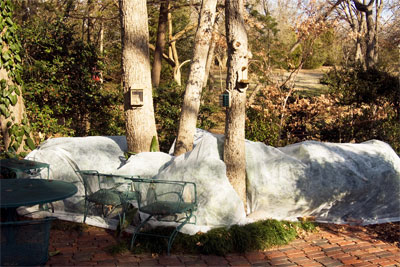From the Sperry Garden – January, 2013

Tender aspidistras (cast iron plants) are huddled beneath frost cloth in Sperry landscape.
Protect your sensitive plants by covering them during extreme cold. Lightweight floating row covers ("frost cloth") from nurseries work very well. Old sheets would suffice — IF you have that many old sheets.
Note: Plastic film is not a good substitute. It overheats too quickly as the sun hits it, even when air temperatures may still be well below freezing. Plants often suffer more damage with plastic film than they would without any protection at all.
To explain: Floating row covers were first developed to protect large expanses of frost-sensitive commercial vegetable fields. Huge rolls were pulled over acres of produce to absorb the sun’s radiant energy and let it be soaked up by the soil. The warmth then re-radiates overnight, and the "blanket" keeps it in proximity to the plants. Moreover, it keeps strong and cold winds from blasting susceptible foliage and flowers. It’s hard to believe that a seemingly porous fabric that weighs little more than a handful of feathers could offer that much help, but it’s well documented.
Frost cloth was introduced into the consumer market probably 20 years ago, and astute gardeners keep it on hand every winter. In fact, many will pre-cut it on a warm fall day, fold it and mark it, then put it into plastic bags for easier access. They’ll hide bricks or river rocks out of sight, waiting to be deployed as anchors to hold the cloth tightly in place atop the plants.
How much will it help? It makes 6 to 10 degrees of difference in the survival of plants that are known to be tender in your area. The aspidistras covered in my photo showed absolutely no cold injury when I finally removed the covers two weeks after a prolonged cold spell. Those few leaves that extended outside the protection were lost.
Retail nurseries have frost cloth in packs, and some even carry rolls. Better grab some up today. You don’t want Cold Man Winter to catch you with your plants down!

